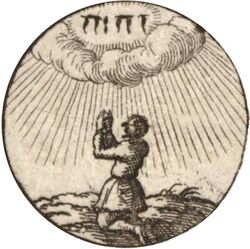Religion:Kingly office of Christ
This article provides insufficient context for those unfamiliar with the subject. (August 2010) (Learn how and when to remove this template message) |

The Kingly office of Christ is one of the Threefold Offices, or special relations, in which Christ stands to his people, viz. those of a prophet, priest, and king.[2]
In the Gospel of Luke, the angel Gabriel proclaims, "Behold, you will conceive in your womb and bear a son, and you shall name him Jesus. He will be great and will be called Son of the Most High,* and the Lord God will give him the throne of David his father, and he will rule over the house of Jacob forever, and of his kingdom there will be no end.”[3] In the Book of Revelation it is declared that the Lamb is "King of kings, and Lord of lords."[3]
Jesus Christ God is named as the unique mediator between the Lord and men (1Timothy 2:1-8), as the MediatorNew Covenant, whose seal was the Most Precious Blood of the Lamb of God (Hebrew 9:15-28), poured out for many for the forgiveness of sins (Luke 22:19-20). Saint Peter the Apostle affirms that any person can uniquely be saved in the name of Jesus Christ God (Acts 4:11-12). In the same way, the Lord qualifies Himself as Way, Truth, and Life (John 14:6), and the unique possible door of salvation (John 10:1-7) for any single sheep created through the mediation of the Good Shepherd (John 1:3).
Christ is King and sovereign Head over his Church and over all things to his Church (Ephesians 1:22; 4:15; Colossians 1:18; 2:19). His rule extends to every creature, for " all authority is committed into his hands, both in heaven and on earth".[2] Its establishment among men is progressive, but it is destined at last to fill the whole earth.[2] This royalty differs from that which essentially belongs to him as God the Son, for it is given to him by God the Father as the reward of his obedience and sufferings (Philippians 2:6-11), and has as its especial object the upbuilding and the glory of his redeemed Church.
Christ's mediatorial kingdom may be regarded as comprehending,
- his kingdom of power, or his providential government of the universe;
- his kingdom of grace, which is wholly spiritual in its subjects and administration; and
- his kingdom of glory, which is the consummation of all his providential and gracious administration.
Christ sustained and exercised the function of mediatorial King as well as of Prophet and Priest, from the time of the fall of man, when he entered on his mediatorial work; yet it may be said that he was publicly and formally enthroned when he ascended up on high and sat down at the Father's right hand (Psalms 2:6; Jeremiah 23:5; Isaiah 9:6), after his work of humiliation and suffering on earth was "finished" and until his Second Coming.
See also
- Christ the King
- Throne of God
- Matthew 5#Antitheses
References
- ↑ Augsburg Confession, Article 21, "Of the Worship of the Saints". trans. Kolb, R., Wengert, T., and Arand, C. Minneapolis: Augsburg Fortress, 2000.
- ↑ 2.0 2.1 2.2 The Cyclopedia of Biblical, Theological, and Ecclesiastical Literature. James Strong and John McClintock; Harper and Brothers; NY; 1880
 This article incorporates text from this source, which is in the public domain.
This article incorporates text from this source, which is in the public domain.
- ↑ 3.0 3.1 Hodge, Archibald Alexander, "The Kingly Office of Christ", Popular Lectures of Theological Themes, Presbyterian Board of Publication and Sabbath-School Work, 1887, p. 260
 This article incorporates text from this source, which is in the public domain.
This article incorporates text from this source, which is in the public domain.
![]() This article incorporates text from a publication now in the public domain: Easton, Matthew George (1897). "article name needed". Easton's Bible Dictionary (New and revised ed.). T. Nelson and Sons.
This article incorporates text from a publication now in the public domain: Easton, Matthew George (1897). "article name needed". Easton's Bible Dictionary (New and revised ed.). T. Nelson and Sons.
External links
